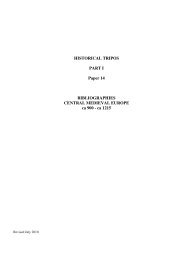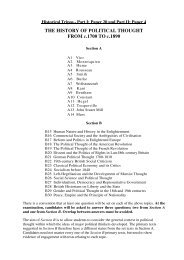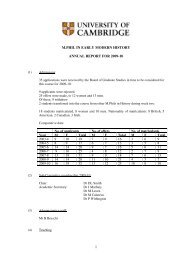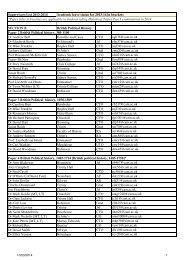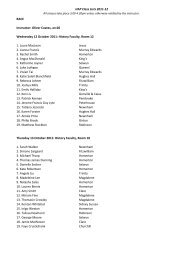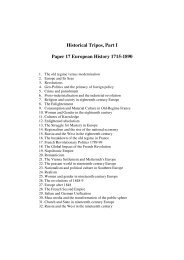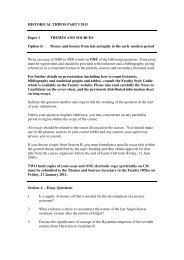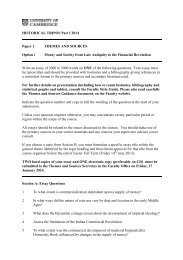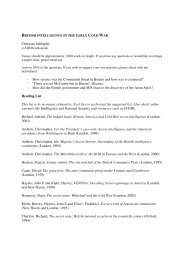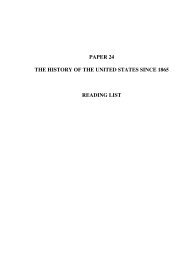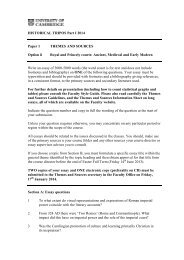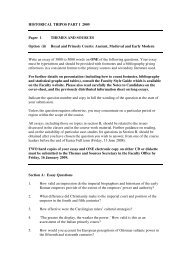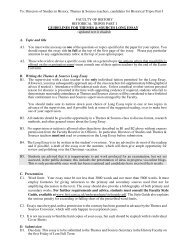Course Handbook - Faculty of History - University of Cambridge
Course Handbook - Faculty of History - University of Cambridge
Course Handbook - Faculty of History - University of Cambridge
You also want an ePaper? Increase the reach of your titles
YUMPU automatically turns print PDFs into web optimized ePapers that Google loves.
M. Foucault, Power/Knowledge (ed. C. Gordon, 1980)<br />
L. Hunt (ed.), The New Cultural <strong>History</strong> (1989)<br />
P. Burke, <strong>History</strong> and Social Theory (1992)<br />
Q.R.D. Skinner (ed.), The Return <strong>of</strong> Grand Theory in Human Sciences (1990)<br />
W. Kula, The Problems and Methods <strong>of</strong> Economic <strong>History</strong> (2001)<br />
Quantitative Research in <strong>History</strong><br />
This class meets once a week in Lent (for 3 weeks) on Mondays at 10am to 12. It consists <strong>of</strong><br />
a series <strong>of</strong> classes to review and discuss the use <strong>of</strong> quantitative methods by economic and<br />
social historians. They are not formally assessed within the course, but attendance is<br />
compulsory.<br />
Introductory reading:<br />
C. Feinstein and M. Thomas, Making <strong>History</strong> Count (2002)<br />
P. Sharpe, <strong>History</strong> by Numbers: an Introduction to Quantitative Approaches (2000)<br />
W.O. Aydelotte, A.G. Bogue, and R.W. Fogel (eds.), The Dimensions <strong>of</strong> Quantitative<br />
Research in <strong>History</strong> (1972)<br />
Social Sciences Research Methods <strong>Course</strong> (SSRMC)<br />
These are a set <strong>of</strong> research training courses in the social sciences organised on an<br />
interdepartmental basis between three administrative Schools <strong>of</strong> the <strong>University</strong>: the School<br />
<strong>of</strong> Humanities and Social Sciences, the School <strong>of</strong> Physical Sciences, and the Judge Business<br />
School. The programme is a shared platform for providing research students with a broad<br />
range <strong>of</strong> quantitative and qualitative research methods skills that are relevant across the<br />
social sciences.<br />
The programme <strong>of</strong>fered by the Joint Schools (JSSS) consists <strong>of</strong> a series <strong>of</strong> core modules and<br />
open access seminars. The core modules are grouped in three categories: Foundations in<br />
Statistics, Advanced Statistics, and Qualitative Methods. They focus on giving students<br />
basic IT skills and introducing them to statistical, quantitative and qualitative research<br />
design, providing the foundations for a research career in the social sciences.<br />
The courses <strong>of</strong>fered by the Joint Schools run through Michaelmas and Lent Terms, with a<br />
deadline to submit the relevant workbooks in late April. The modules are taught through a<br />
combination <strong>of</strong> lectures and practical classes by staff from several <strong>University</strong> Departments<br />
and Faculties.<br />
PLEASE REFER TO THE JOINT SCHOOLS HANDBOOK FOR DETAILS, DATES<br />
AND DESCRIPTION OF THE COURSES.<br />
Students doing the MPhil in Economic and Social <strong>History</strong> are entitled to take as many<br />
modules as they wish, but in order to satisfy the requirements <strong>of</strong> the MPhil they must<br />
attend and submit the workbooks/assignments <strong>of</strong> at least five modules, as follows:<br />
• SPSS and Descriptive Statistics (four sessions, Michaelmas)<br />
o 1. Introduction to SPSS and basic statistical concepts<br />
o 2. Statistical models and elementary data analysis with SPSS<br />
o 3. Management <strong>of</strong> data and output<br />
o 4. Getting the best out <strong>of</strong> SPSS<br />
• Linear Regression (four sessions, Lent)<br />
o 1. Review <strong>of</strong> covariance, correlations and comparison <strong>of</strong> means.<br />
Introduction to bivariate linear regression<br />
o 2. Multivariate linear regression<br />
o 3. Assessing regression models.<br />
o 4. Overview and summary <strong>of</strong> topics in regression<br />
4




